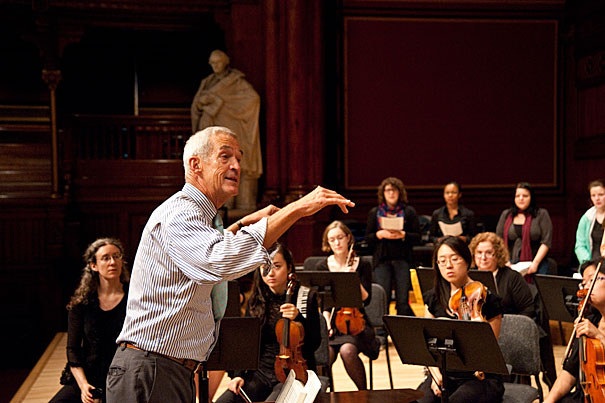
“ ‘Harvard’s Great Teachers’ is a video series that showcases our faculty sharing their ideas, talking about what they do in the classroom, very much in the liberal arts tradition,” said FAS Dean Michael D. Smith. Among the faculty members who will appear in the initial set of videos is Thomas F. Kelly, the Morton B. Knafel Professor of Music, (pictured).
File photo by Jon Chase/Harvard Staff Photographer
A peek into Harvard classrooms
Video series highlights University’s exceptional teachers
Anyone who’s ever wanted to get a peek inside a Harvard classroom will soon have a chance.
In conjunction with the University’s 375th anniversary, the Faculty of Arts and Sciences (FAS) is launching a new video series, “Harvard’s Great Teachers,” highlighting Harvard’s world-class faculty and offering a sampling of the exciting and innovative teaching experienced by Harvard students.
“ ‘Harvard’s Great Teachers’ is a video series that showcases our faculty sharing their ideas, talking about what they do in the classroom, very much in the liberal arts tradition,” said FAS Dean Michael D. Smith. “Harvard is a place where the nuance, complexity, and the sometimes startling beauty of ideas are explored. We hope these videos will illustrate for viewers the type of exciting and important conversations that happen here every day between our faculty and students.”
The series launches today with more than a dozen separate videos, ranging in length from a few minutes to a full hour, in which faculty members discuss their approach to teaching and explore topics they are passionate about. Other videos include full-length classroom lectures, visits to different locations on campus, and interviews with students about the Harvard classroom experience. Among the faculty members who will appear in the initial set of videos:
- Peter Galison, the Pellegrino University Professor, who discusses the effect of historical context on the genesis of Einstein’s discoveries, along with the ways in which these discoveries affected modern notions of time and space.
- Thomas F. Kelly, the Morton B. Knafel Professor of Music, who offers viewers an inside look at the ideas and activities that make his “First Nights” course one of Harvard’s most popular and enduring institutions. Kelly’s thoughts on the significance of first performances — whether it is the debut of Stravinsky’s “Rite of Spring” or the first performance of the original, student-performed work that completes the term — offer a conceptually rich and powerfully moving account of the role music can play in human experience.
- Lisa Randall, the Frank B. Baird Jr. Professor of Science, who discusses the importance of scale to her work as a physicist and to our ways of seeing and understanding the world around us. In her new book, “Knocking on Heaven’s Door,” and in her collaborations with artists and composers — such as her recent curation of the “Measure for Measure” exhibit at Harvard’s Carpenter Center — Randall manages to communicate the difficult concepts of her research in both lucid and provocative ways.
- Jonathan Zittrain, professor of law in the faculty of law and professor of computer science in the Harvard School of Engineering and Applied Sciences, who discusses topics ranging from his vision of the Internet as “random acts of kindness” to the dangers of online crowdsourcing to his innovative and interdisciplinary classroom practices.
Videos will be added over the course of the spring semester. The series will run for up to five years, with as many as six new videos being produced each year.
“We want to show how exciting it is to be in the classroom these days,” said Evelynn M. Hammonds, dean of Harvard College and Barbara Gutmann Rosenkrantz Professor of the History of Science and of African and African American Studies. “It’s not a passive experience — it’s quite dynamic and thought-provoking. What we want to capture in this series and bring to the world is the excitement of intellectual inquiry in Harvard’s classrooms.”
“Central to everything we do is the 150-year-old idea of a university devoted to interweaving teaching and research,” said Galison, who serves as faculty adviser on the series. “Our research — across the sciences, social sciences, and humanities — finds its way into the world. Sometimes that passage is through scientific articles, interpretive books, or national policy. But traditionally, we have had fewer means for conveying the huge amount of work that goes into finding new and exciting ways of teaching: new teaching methods on one side, and the integration of new knowledge on the other. Our hope with these short videos is that we could make visible some of the innovative and compelling ways that teaching is developing here. It is, I am convinced, a first step in a major new initiative that we are undertaking to rethink the Harvard classroom for the 21st century — and to share those results.”
The video series, produced by the Derek Bok Center for Teaching and Learning, reflects a renewed focus on teaching and learning at FAS and across the University. In 2010, Smith reported to the faculty on his efforts to support great teaching and learning, alongside great scholarship.
Other efforts include Conversations@FAS, a series of faculty panels launched last year by Smith. Participants last year shared best practices and innovative methods with fellow faculty and teaching staff in three areas: active learning, instilling a global perspective, and teaching with collections. To mark Harvard’s 375th anniversary, Professor of History Maya Jasanoff recently moderated a pair of discussions about the FAS at 400, imagining how Harvard’s approach to its teaching and research might change and what core elements might stand the test of time.
Both the series and the Conversations@FAS panels complement the University-wide Harvard Initiative for Learning and Teaching (HILT) symposium held Feb. 3. The conference offered faculty and students the opportunity to engage in dialogue and debate while sharing ideas and information about pedagogical innovation, and was developed as part of a $40 million gift from Rita E. and Gustave M. Hauser.
To view the “Harvard’s Great Teachers” series.




